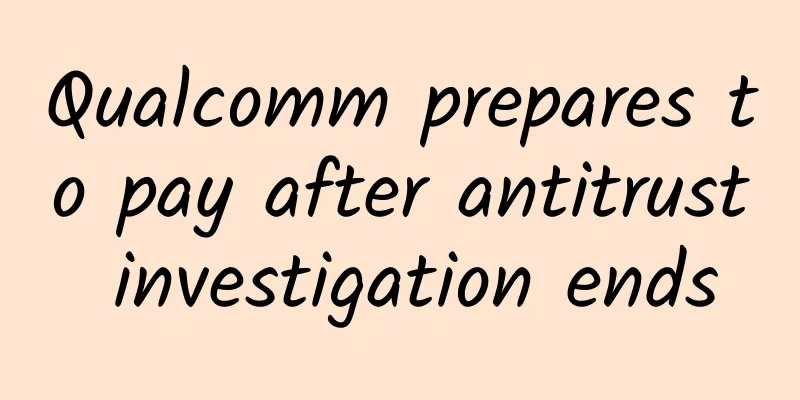Qualcomm prepares to pay after antitrust investigation ends

|
Yesterday, Xu Kunlin, director of the Price Supervision and Anti-Monopoly Bureau of the National Development and Reform Commission, revealed at the State Council's anti-monopoly briefing that the anti-monopoly investigation against Qualcomm of the United States has basically ended, and after the final communication, it will soon enter the punishment procedure. Talk about 7 times Qualcomm lawyers were always present Qualcomm, an American smartphone chip manufacturer, has been accused of engaging in suspected monopolistic practices in China for many years, including charging unreasonable licensing fees, which has led to suppression of China's mobile phone industry and increased the cost of purchasing mobile phones for consumers. Xu Kunlin said that in 2011, two American companies reported Qualcomm to the NDRC. Last year, companies from some Asian countries and domestic companies collectively reported that Qualcomm had monopolistic behavior. After the NDRC conducted preliminary investigations and obtained evidence, it decided to launch an investigation into it. In December 2013, the Anti-Monopoly Bureau of the National Development and Reform Commission officially launched an investigation into Qualcomm's suspected monopoly. According to previously released official information, Qualcomm's suspected illegal behaviors include: bundling standard essential patents with non-standard essential patents, continuing to charge for expired patents, bundling patent licenses with chip sales, etc. Yesterday, Xu Kunlin said that the antitrust investigation against Qualcomm has basically ended. On the morning of September 12, Qualcomm’s president will have final communication with the National Development and Reform Commission and will soon enter the punishment procedure. According to Xu Kunlin, this is his fifth meeting with Qualcomm's president. The NDRC did not restrict the time, location, number of people, etc. when communicating with Qualcomm. The two sides held seven talks in total, and Qualcomm's lawyers were present from beginning to end. It was not "not allowing lawyers to be present" as the outside world said. The NDRC even encouraged Qualcomm to hire the world's most famous lawyers to participate in the negotiations. So far, Qualcomm's head has visited the NDRC four times for communication. During the fourth communication, Qualcomm said it would "improve" the issues previously announced by the NDRC and "work hard to find a final solution", which is seen as a signal that the antitrust investigation against Qualcomm is about to end. The reporter was unable to learn the amount of the penalty from the National Development and Reform Commission yesterday, but according to industry insiders, Qualcomm's fine "will not be small." Qualcomm said it "hopes to achieve win-win results with Chinese companies" On September 10, Qualcomm Chairman and CEO Paul Jacobs appeared at a forum at the 2014 Summer Davos in Tianjin. When asked by reporters about the "antitrust investigation", he said "no comment." However, Paul Jacobs is full of confidence in Qualcomm's future in China. He said that Qualcomm currently has cooperation with more than 90 companies in China, which shows Qualcomm's determination to innovate and develop. China has a large space for innovation in the future in semiconductors, biomedicine, 4G and other fields. Lu Wei, director of the Cyberspace Administration of China, who also attended the 2014 Summer Davos, said at the forum, "Data shows that Qualcomm earned more than 24 billion US dollars, and half of the profits came from China." Qualcomm executives responded to Lu Wei on the spot, saying: "There is a lot of room for development here, and great potential in the future. It should be a win-win situation for Qualcomm, Chinese companies, and Chinese consumers. I also hope that this win-win situation can continue for a long time in the future." Related news: "Qualcomm hired Zhang Xinzhu for $1.4 million" Yesterday, Xu Kunlin, director of the Price Supervision and Anti-Monopoly Bureau of the National Development and Reform Commission, revealed that Qualcomm's remuneration for hiring Zhang Xinzhu was US$1.4 million, and the latter's unit confirmed that it had received US$77,000. On August 12, 2014, Zhang Xinzhu, a researcher at the Chinese Academy of Social Sciences, was dismissed for violating the working discipline of the Expert Advisory Group of the Anti-Monopoly Commission of the State Council. On the same day, Zhang Xinzhu responded that it was because he “spoke for foreign companies.” Later, there were reports that Zhang Xinzhu accepted a $6 million reward from Qualcomm, which Zhang denied and called “nonsense.” Yesterday, Xu Kunlin revealed that Qualcomm's total compensation for hiring Zhang Xinzhu to handle antitrust investigations was $1.4 million. Xu Kunlin said that when the president of Qualcomm met him for the second time this year, he gave him a report that included three reports written by experts and scholars, and specifically reminded Xu Kunlin to read a report written by Zhang Xinzhu, a researcher at the Chinese Academy of Social Sciences and a member of the expert advisory group of the State Council Anti-Monopoly Expert Committee. Xu Kunlin said that after reading it, he found that Zhang Xinzhu specifically noted that he was a member of the expert advisory group of the State Council Anti-Monopoly Expert Committee. Comparing it with the work discipline of Chapter 3 of the "Working Rules of the Expert Advisory Group of the State Council Anti-Monopoly Committee", he found that he had seriously violated the discipline. He immediately reported it in writing to the State Council Anti-Monopoly Committee. According to Xu Kunlin, Zhang Xinzhu was hired by Qualcomm and wrote a report of several hundred pages for it, and the remuneration for the report was US$200,000. "When we were investigating, Qualcomm said it had paid Zhang Xinzhu $880,000. According to the bills from Zhang Xinzhu's unit, Qualcomm had paid Zhang Xinzhu himself $93,000, and Zhang Xinzhu's unit confirmed that it had received $77,000. Based on Zhang Xinzhu's effective working hours, his personal remuneration was $800 per hour," said Xu Kunlin. Xu Kunlin said that the case of Zhang Xinzhu suspected of accepting remuneration will be dealt with according to the law based on the results of the investigation. Data: The National Development and Reform Commission has issued more than 3.2 billion antitrust fines in the past three years According to statistics based on information publicly disclosed by the National Development and Reform Commission, from 2011 to date, the National Development and Reform Commission has issued 11 batches of antitrust fines, covering industries including medicine, electronics, liquor, milk powder, gold, tourism, lenses, insurance, cement, automobiles and auto parts, with a total amount of fines exceeding RMB 3.25 billion. After my country's Anti-Monopoly Law was officially implemented in August 2008, the National Development and Reform Commission's Price Supervision, Inspection and Anti-Monopoly Bureau was established in July 2011 as the department responsible for anti-monopoly work in the National Development and Reform Commission. Among the antitrust fines, the highest total fine was imposed on 12 Japanese auto parts and bearing manufacturers, exceeding 1.2 billion yuan. In early August this year, the National Development and Reform Commission's anti-monopoly investigation team made a surprise visit to Mercedes-Benz's Shanghai office. Subsequently, the National Development and Reform Commission said that it was still investigating whether Mercedes-Benz was a monopoly. According to media reports, an insider of BMW (China) revealed that BMW was one of the companies that the National Development and Reform Commission had interviewed for anti-monopoly investigations. Toyota's Lexus was recently interviewed by the National Development and Reform Commission. In November 2011, the National Development and Reform Commission announced that it had launched an antitrust investigation into China Telecom and China Unicom over broadband access issues. In February this year, Xu Kunlin, director of the Anti-Monopoly Bureau of the National Development and Reform Commission, revealed that China Telecom and China Unicom had submitted their latest rectification reports. The State Administration for Industry and Commerce has not yet announced the final results of its investigation into Microsoft, Tetra Pak and other companies. As a winner of Toutiao's Qingyun Plan and Baijiahao's Bai+ Plan, the 2019 Baidu Digital Author of the Year, the Baijiahao's Most Popular Author in the Technology Field, the 2019 Sogou Technology and Culture Author, and the 2021 Baijiahao Quarterly Influential Creator, he has won many awards, including the 2013 Sohu Best Industry Media Person, the 2015 China New Media Entrepreneurship Competition Beijing Third Place, the 2015 Guangmang Experience Award, the 2015 China New Media Entrepreneurship Competition Finals Third Place, and the 2018 Baidu Dynamic Annual Powerful Celebrity. |
<<: Why doesn't Apple use an "iWatch"?
>>: Luxury watch executives complain about Apple Watch: It's for women
Recommend
A hero may not always ride on colorful clouds, but may ride on a small boat...
Recently, Xinyang City, Henan Province A young ma...
Why are people who talk more nonsense happier?
This article was reviewed by Zhao Wei, MD, associ...
More exciting than Chinajoy? An in-depth analysis of the Nibiru air combat chair
The annual Chinajoy exhibition officially ended i...
Volkswagen plans to cut 30,000 jobs and save $3.9 billion in expenses
Volkswagen announced on Friday that it will cut u...
Brand naming methodology
There is a story in the advertising industry that...
The seventh episode of the Aite Tribe Clinic: What function was used to write the King of Pesticide Welfare Bureau?
【51CTO.com original article】 Activity description...
A book reveals the secrets of dynasty change
The history is rolling and the emperors throughout...
User Operation: AARRR Model for Products from 0 to 200,000 Users
Without further ado, the full article is structur...
[Practical Case] Promote to millions of users at zero cost!
This article is shared by Zhang Zihao, Operations...
Zhihu advertising promotion, Zhihu advertising process
Today I would like to share with you the content ...
The electromagnetic guns in the movie are used to fight aliens, while our electromagnetic guns are used to put out fires.
There was a scene like this in the movie "Tr...
Potatoes can cause poisoning if kept in the refrigerator...Do vegetables really need to be kept in the refrigerator?
Source: A Brief History This article has been aut...
Brands must do these 5 things to stand out!
I believe that many people who do brand marketing...
Zhihu traffic-generating method, collection!
Recently, I discovered a quick way to attract fol...
Tik Tok Android Performance Optimization Series: Startup Optimization Practice
Startup performance is the face of the app user e...









